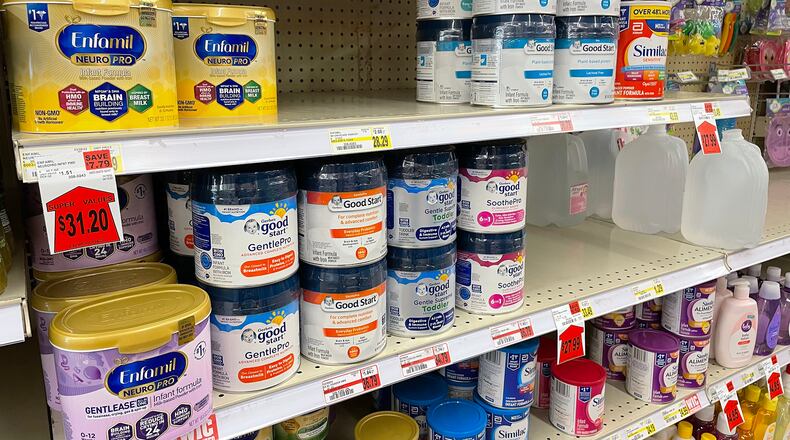Ohio’s Special Supplemental Nutrition Program for Women, Infants, and Children, better known as WIC, is a federally funded program that provides free baby formula and food to over 164,000 children and women. The waivers are an attempt to address the strict guidelines of the program that say what brand and how much of infant formula a mother can purchase at a time.
“While it is good news that the formula factory that caused the shortage is operating again, it will take weeks for formula to restock, in the meantime we will continue our work to ease the burden on families,” DeWine said. “There are few things scarier than the thought of not being able to provide food for your children. I feel for the many families impacted by the formula shortage. I am pleased that the USDA has granted our additional waiver requests to allow eight more WIC-approved products for families enrolled in the program.”
The Ohio Department of Health applied for waivers back in February.
Abbott Nutrition restarted infant formula production at its Michigan facility Saturday after the company reached an agreement with the FDA last month. The factory, the largest in the U.S., had been closed since February due to contamination. The company said Saturday that it will take about three weeks to get its first shipment out to consumers, with its initial batch of EleCare products shipping around June 20.
Abbott is prioritizing specialty and metabolic formulas, with plans to restart production of Similac and other formulas as soon as possible, the company said in a statement.
In May, mothers in the region said they have been scrambling for months to find baby formula.
Kimbia Ingram, a Springfield mother of 4-month-old twins, hunts for a can of formula for her babies every day. If she can’t drop off Alonni and Aleyea with a babysitter, she loads up their stroller, diaper bag and other necessities. She often has to check five stores in town, and sometimes travels to Urbana or even parts of the broader Dayton area. She said she’s lucky if she finds even one can on a shelf during her search.
“They’re hungry, they’re crying,” she said. “And I have nothing to feed them, and I can’t let my babies go hungry. It’s frustrating.”
Madilynn Harrison of Kettering found formula by joining Facebook groups and finding other moms with extra formula for her son. Her son, who is two months old, was breastfed until he began having reflux issues, and Harrison switched to hypoallergenic formula Nutramigen.
“Since we have been breastfeeding, we had not even thought about formula until we had no other option,” she said. “After his appointment, I rushed around for hours and felt defeated when I couldn’t find anything. His pediatrician didn’t even have a sample can for us.”
Harrison looked at over 20 stores within an hour drive of her home in Kettering, and only found one can of off-brand hypoallergenic, which she says might last four days.
“Every morning before work, I check stores to see if it has been restocked, only to find out it has been on backorder for months now. They order it and it never shows up on the truck. It’s unavailable on Amazon, and on the Enfamil website,” she said. “The uncertainty of if my baby will have food is so scary.”
The state is also working with the USDA to temporarily remove burdensome requirements for WIC families who use prescription formula. Currently, a WIC participant can only purchase the specific brand prescribed by the child’s healthcare provider. The waiver allows families enrolled in WIC to purchase store-brand equivalents of certain formulas without returning to their doctor for a new prescription.
“There’s nothing more aggravating or more scary for a family to need food for their children and not being able to do that,” the governor said at a press conference Monday in Cincinnati.
The Ohio Department of Health is also working with Mead Johnson to allow Ohio families to purchase alternate, non-contracted brands. Mead Johnson is contracted with the Health Department to provide formula for the WIC program. The Department of Health has urged formula manufacturers, the USDA, and U.S. Department of Health to “reduce the barriers” to formula access, DeWine said, adding that WIC program staff across the state have been working with healthcare providers and families enrolled in WIC to find alternative formulas.
During the press conference, Ohio Department of Health Director Dr. Bruce Vanderhoff advised against diluting formula to make it last longer, or making formula from scratch, for safety reasons.
“It’s a very bad idea,” he said.
WIC participants are encouraged to reach out to their local WIC office for information about their benefits and what formula is available.
Additional formulas approved
The USDA approved Ohio’s WIC program for eight additional Mead Johnson products that will be covered beginning June 13, including:
- Enfamil Infant Powder 29.4oz
- Enfamil NeuroPro Infant Powder 28.3oz
- Enfamil NeuroPro Infant Powder Box 31.4 oz
- Enfamil Gentlease Powder 27.7oz
- Enfamil NeuroPro Gentlease Powder 27.4 oz
- Enfamil NeuroPro Gentlease Powder Box 30.4 oz
- Enfamil AR Powder Box 30.4 oz
- Enfamil Prosobee Powder 20.9oz
About the Author

